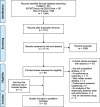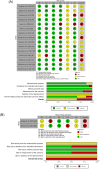The Impact of Sleep Interventions on Athletic Performance: A Systematic Review
- PMID: 37462808
- PMCID: PMC10354314
- DOI: 10.1186/s40798-023-00599-z
The Impact of Sleep Interventions on Athletic Performance: A Systematic Review
Abstract
Background: Sleep is essential for maximal performance in the athletic population. Despite that, the sport context has many factors that can negatively influence athletes' sleep and subsequent recovery.
Objectives: The purpose of this systematic review was to synthesize the most recent literature regarding sleep interventions aimed at improving sleep and subsequent performance in athletes.
Methods: The present systematic review was conducted based on the PRISMA guidelines and the PICOS approach. The search was conducted in May 2022 using the electronic database PubMed, SPORTDiscus via EBSCOhost, and Web of Science. Once extracted, studies were included if they met the following criteria: (1) participants were athletes of individual or team sports; (2) implemented an intervention aimed at improving sleep; (3) measured at least one objective performance/recovery outcome; and (4) reported the relationship between sleep and performance.
Results: The search returned 1584 records. Following the screening, a total of 25 studies met our inclusion criteria. All the included articles were intervention studies published between 2011 and 2021. The included studies implemented various sleep interventions, such as sleep hygiene, naps, sleep extension, light manipulation, cold water immersion, mindfulness, or a combination of two or more strategies. Sleep extension and naps were the most representative and most effective strategies to improve sleep and performance. Mindfulness and light manipulation demonstrated promising results, but more studies are needed to confirm these findings. Sleep hygiene, removing electronic devices at night, and cold water immersion had no effects on sleep and subsequent performance/recovery, but these results are based on a few studies only.
Conclusion: While acknowledging the limited amount of high-quality evidence reviewed, it appears that increasing sleep duration at night or through napping was the most effective interventions to improve physical and/or cognitive performance. Protocol Registration This protocol was registered in the International Platform of Registered Systematic Review and Meta-Analysis Protocols (INPLASY) on May 11, 2022, with the registration number INPLASY202250069.
Keywords: Athletes; Performance; Sleep interventions.
© 2023. The Author(s).
Conflict of interest statement
The authors declare that they have no competing interests.
Figures




References
Publication types
Grants and funding
LinkOut - more resources
Full Text Sources
Miscellaneous

